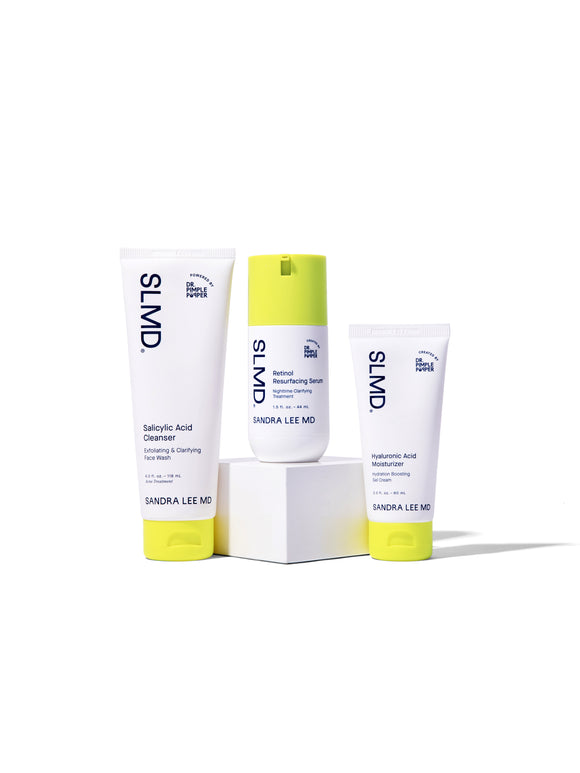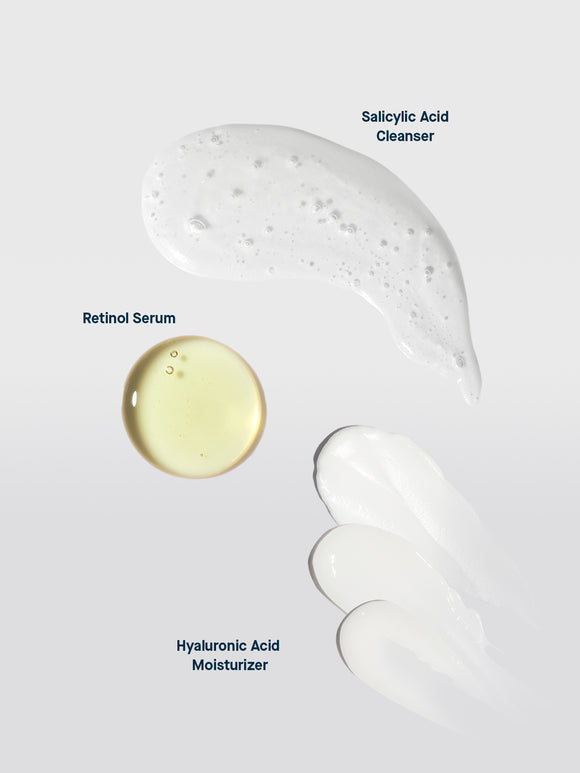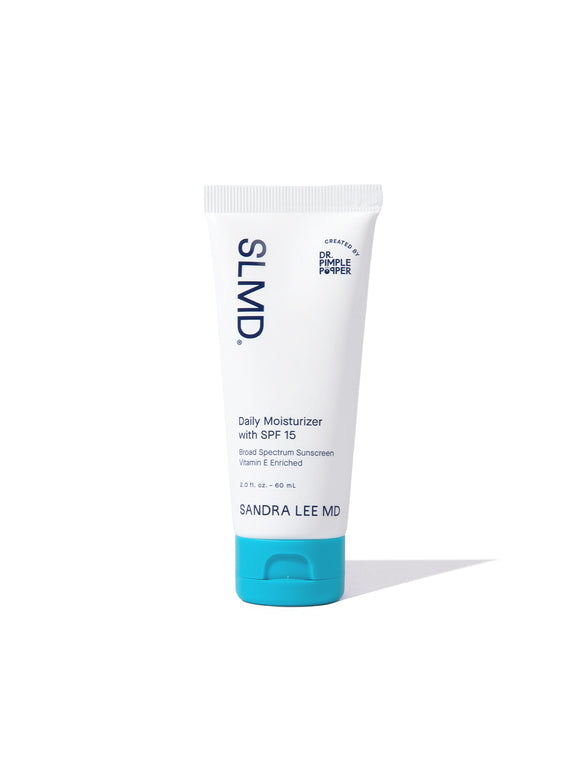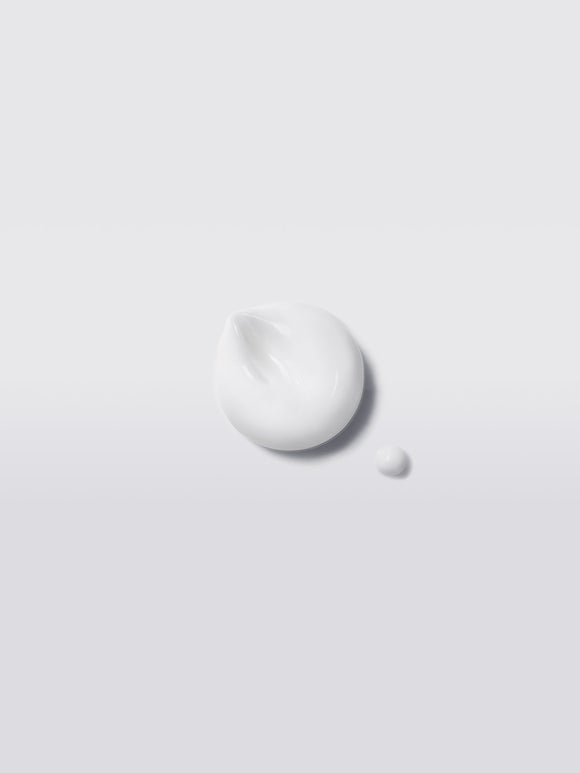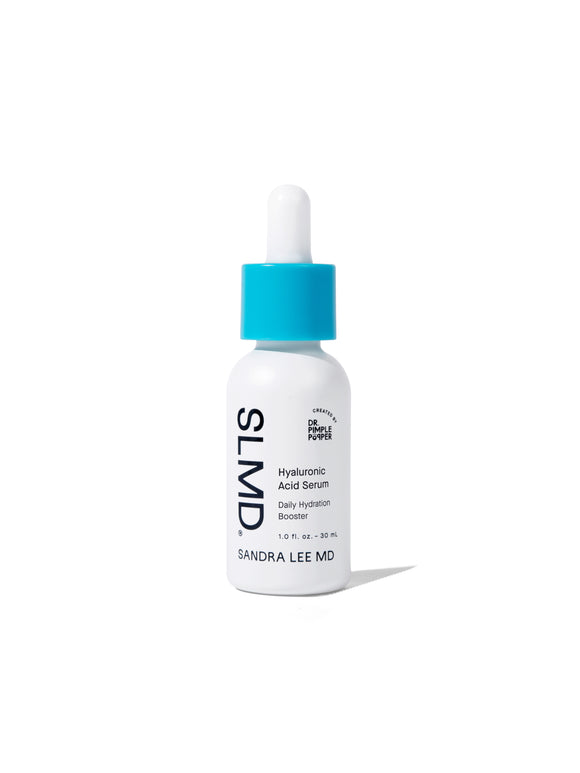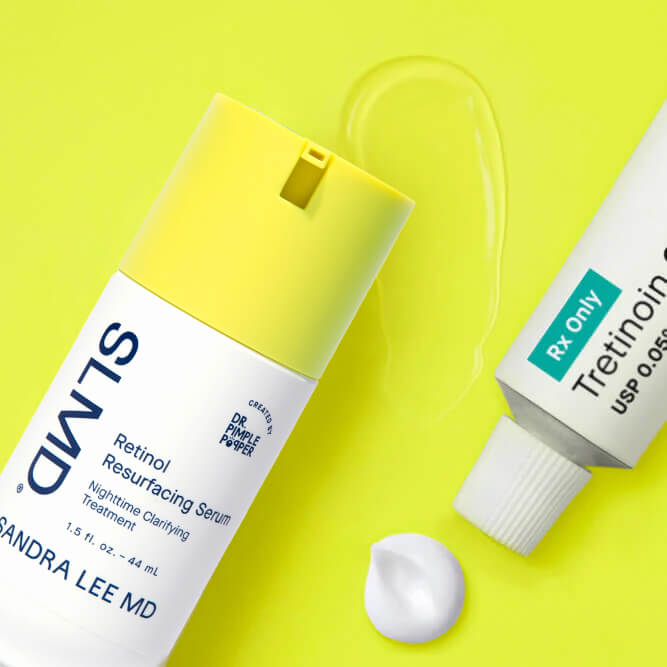
OTC Retinol vs. Prescription Retinoids: What’s Best for Your Skin?
Dr. Pimple Popper helps you decide which form of this powerful active is right for you.
Published:
3 minute read
Retinoids are powerful skincare ingredients known for their ability to treat acne, reduce signs of aging, and improve overall skin texture. But how do you choose between over-the-counter (OTC) retinol and prescription-strength retinoids? Sandra Lee, MD (aka Dr. Pimple Popper) explains the differences, benefits, and best use cases to help you decide what works best for your skin type and goals.
Article Quick Links
What’s the difference between OTC retinol and prescription retinoids?
All retinoids are derivatives of vitamin A, but their strength, absorption, and effectiveness vary:
- OTC retinol: Found in many drugstore and skincare products, retinol undergoes a chemical conversion in the skin to become active retinoic acid. This makes it milder and slower-acting—ideal for sensitive skin or first-time users. Learn more about starting retinol in our Beginner’s Retinol Guide.
-
Prescription retinoids: These products, such as tretinoin (Retin-A) and adapalene (Differin), contain active retinoic acid and work faster to deliver noticeable results. However, they often cause:
- Redness
- Peeling
- Irritation
Pro tip: Start with OTC retinol to build tolerance before transitioning to prescription retinoids under a dermatologist’s guidance. For a gentle start, try SLMD Retinol Resurfacing Serum.
Choosing the best retinoid for your skin concerns
| CONCERN/GOAL | BEST OPTION | WHY |
| Mild to moderate acne | OTC retinol | Gentle & effective for non-severe cases |
| Severe acne | Prescription retinoids | Stronger formulations for deeper breakouts |
| Early signs of aging | OTC retinol | Prevents wrinkles and boosts skin renewal |
| Deep wrinkles | Prescription retinoids | Faster results for visible aging signs |
| Sensitive skin | OTC retinol | Less irritating, easier to tolerate |
| Quick results | Prescription retinoids | Shorter time frame for noticeable results |
Dr. Pimple Popper's Retinol Routine Picks
Tailoring retinoids to your skin type and goals
Dr. Lee recommends starting with a lower concentration of retinoids before moving to stronger formulations. As always, your dermatologist can help with your individual needs — but here’s a guide on how to choose based on specific skin concerns:
Non-inflammatory acne ( blackheads & whiteheads)
Over-the-counter retinol helps unclog pores and reduce mild acne. Choose non-comedogenic formulas like SLMD Retinol Resurfacing Serum for clearer skin without worsening breakouts.
Mild to moderate inflammatory acne ( papules & pustules)
For mild to moderate inflammatory acne:
- Combine OTC retinol with SLMD Benzoyl Peroxide Acne Spot Treatment in your morning routine.
- For persistent acne or scarring, consult a dermatologist for prescription treatments such as adapalene or tretinoin.
Moderate to severe inflammatory acne (nodules & cysts)
Deep, cystic acne requires stronger intervention:
- Tretinoin: a powerful topical gel or cream
- Adapalene: ideal for sensitive skin with fewer side effects
- Isotretinoin: a prescription oral medication for severe, treatment-resistant acne
Preventive anti-aging (well-aging)
Start using retinol in your 20s to prevent signs of premature aging, like fine lines and wrinkles. For most skin types, Dr. Lee recommends an over-the-counter formula with soothing ingredients, like SLMD Retinol Resurfacing Serum.
Photodamaged skin (sun damage & aging signs)
Visible signs of aging such as:
- Hyperpigmentation
- Uneven skin tone
- Wrinkles and fine lines
- Loss of elasticity
Start with an OTC retinol for gradual improvement or consider tretinoin for faster, more dramatic results.
Dr. Pimple Popper's tips for maximizing retinoid results
- Start slow: Use retinoids 2-3 times a week to build tolerance.
- Hydrate & soothe: Pair with hydrating serums like SLMD Hyaluronic Acid Serum to prevent dryness.
- Sun protection: Retinoids can leave skin more prone to UV damage, so use SPF daily. Try: SLMD Daily Moisturizer with SPF 15
- Alternate ingredients: For sensitive skin, avoid using AHAs/BHAs on the same nights as retinol unless guided by a dermatologist.
FAQs: Choosing the right retinoid
Q: How long does it take to see results from retinoids?
A: Results vary based on the type of retinoid and your skin concern. OTC retinol typically shows improvements within 3-6 months, while prescription retinoids can work faster, delivering noticeable changes in 6-12 weeks. For acne treatment timelines, read more here, and for anti-aging benefits, check out this guide.
Q: When should I switch from OTC to prescription retinoids?
A: If you don’t see noticeable improvements after three months of consistent OTC use, consult a dermatologist. For severe acne or signs of scarring, seek professional guidance sooner.
Q: Can retinol and hyperpigmentation treatments be used together?
A: Yes. Apply hyperpigmentation treatments first, followed by retinol at night. Alternate usage if irritation occurs. Learn more about layering skincare products here.

Dr. Lee's Last Word
Choosing the right retinoid isn’t just about strength — it’s about what your skin needs and how it reacts. Start slow, stay consistent, and don’t forget sun protection to maximize results.





